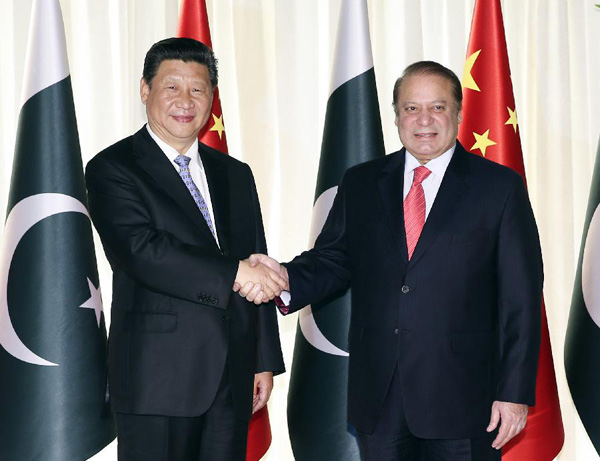Xi in Pakistan to work for real mutual benefits
Updated: 2015-04-21 08:01
(China Daily)
|
|||||||||||
 |
|
Visiting Chinese President Xi Jinping (L) holds talks with Pakistani Prime Minister Nawaz Sharif in Islamabad, capital of Pakistan, April 20, 2015. [Photo/Xinhua] |
Because of the sheer scope of China's financial commitment to meeting Pakistan's infrastructure and energy needs, as well as that country's peculiar geopolitical position in South Asia, President Xi Jinping's visit to Islamabad is being read by outsiders as a power play.
But that is a thorough misunderstanding of the Sino-Pakistani relationship.
For outsiders, the obvious disparity between the two immediate neighbors, in size, national strength and plenty of other aspects sets the stage for an unequal relationship.
But from Xi to the average man on the street in China, Pakistan has never been just another neighbor. Bilateral ties are approached here with a special sense of brotherhood. Few of China's partnerships with foreign countries have seen the degree of popular endorsement as that with Pakistan.
That Pakistan donated all the tents in its strategic reserves, more than 20,000, to China when an earthquake devastated Wenchuan in 2008 stands as an eye-watering footnote to the popular appellation batie, or "Pakistan our best buddy". Which was used by Xi during his talk about the two countries' "all-weather strategic partnership" with visiting Pakistani Prime Minister Nawaz Sharif in 2013. In 2014, Xi told visiting Pakistani President Mamnoon Hussain that our countries are good friends, partners, neighbors, and brothers that stand together through storm and stress. That explains why Xi's trip to Islamabad is well anticipated.
The China-Pakistan partnership has become what it is precisely because it is free of power play. It is a real-world template of the state-to-state relations Chinese foreign policy pursues. It is built on mutual respect and benefits.
The China-Pakistan Economic Corridor cannot fail because it serves some of the two countries' most pressing needs. And Pakistan wants it as much as China does.
The corridor will offer China an additional route for energy imports. Extensive infrastructure projects will greatly ease Pakistan's transport and logistics bottlenecks, which the World Bank said cost 4 to 6 percent of its annual GDP. Energy projects on the drawing board are expected to double the country's power supplies. They are essential for rebooting Pakistan's underperforming economy, and turning it into a regional economic hub.
More important, the corridor is a significant opening move on the "Belt and Road Initiative" chessboard.
Many variables may create troubles for the joint development endeavors, security concerns in particular. But the long-term rapport is a precious asset for both countries.
Related Stories
China, Pakistan elevate relations, commit to long-lasting friendship 2015-04-21 05:02
Xi seals deals on Pakistan trip 2015-04-21 04:48
China, Pakistan lift ties to all-weather strategic partnership of cooperation 2015-04-20 22:00
China-Pakistan traditional friendship faces new development opportunities 2015-04-20 13:07
Today's Top News
Russia willing to restore relations with Kiev: Putin
Asian markets jumpstart UK car industry
Smog magnifies staffing woes for EU firms
Silk Road initiatives to connect people's hearts
AIIB to operate in 'transparent way'
PLA to buy advanced missiles from Russia
EU accuses Google of hurting consumers, competitors
Q1 economic data: what the economists say
Hot Topics
Lunar probe , China growth forecasts, Emission rules get tougher, China seen through 'colored lens', International board,
Editor's Picks

|

|

|

|

|

|






